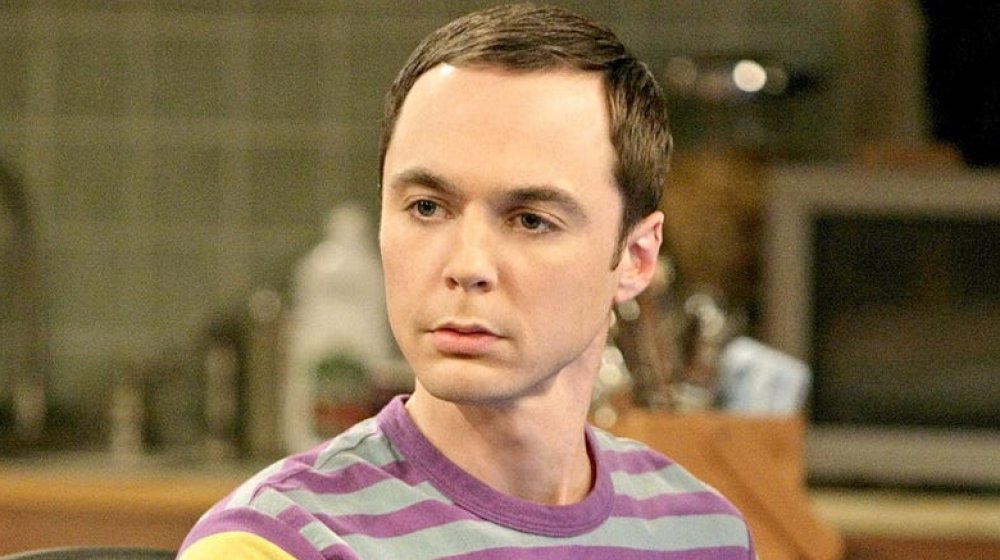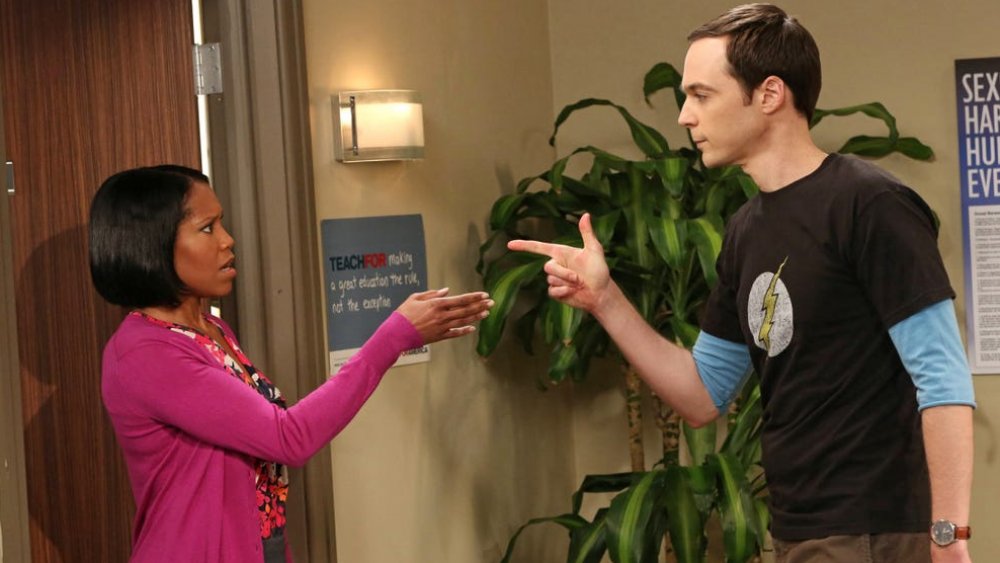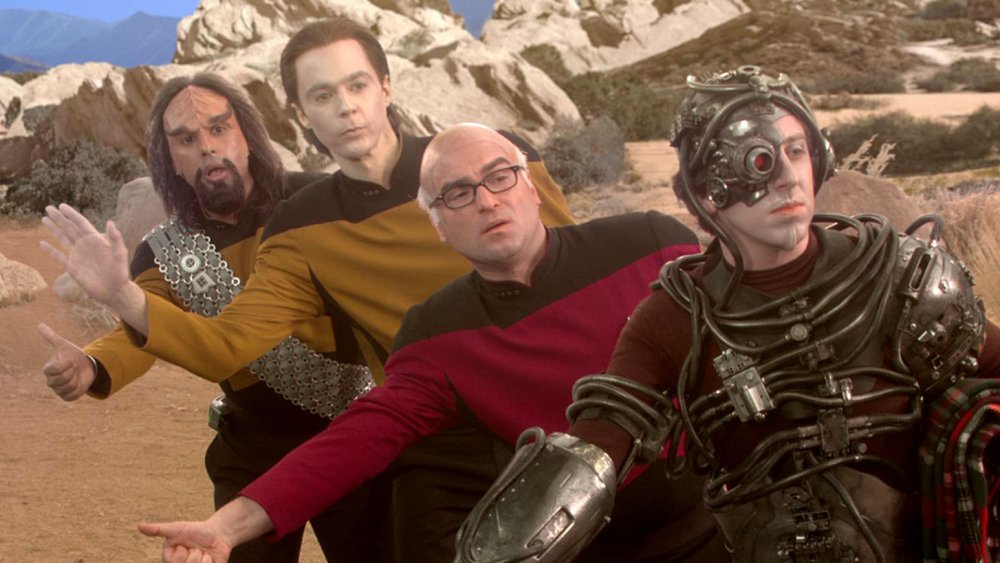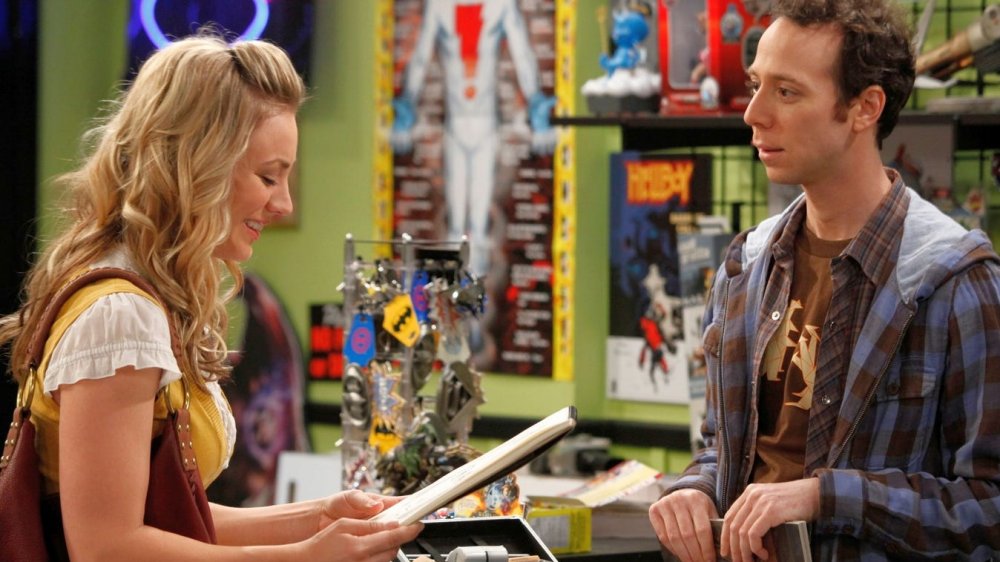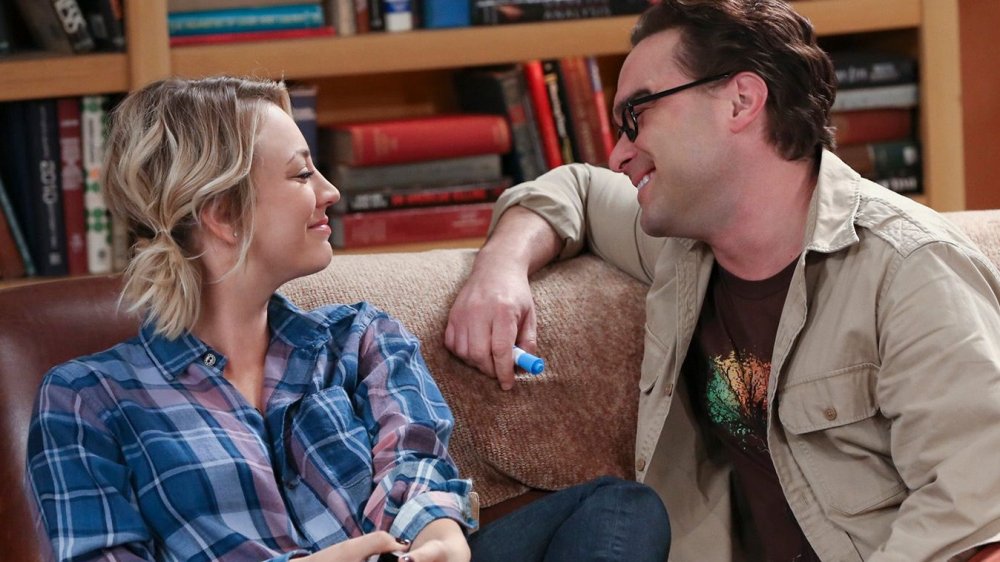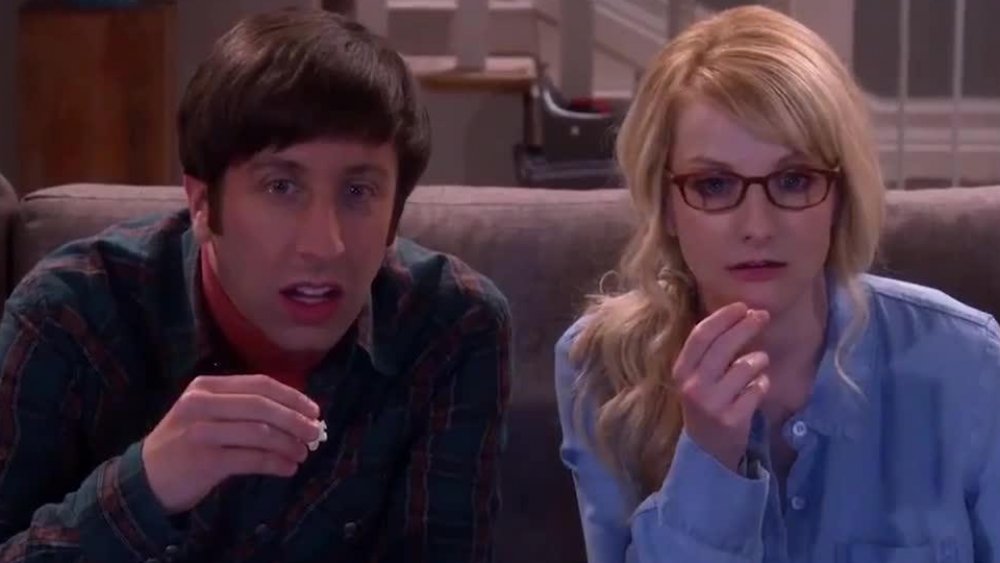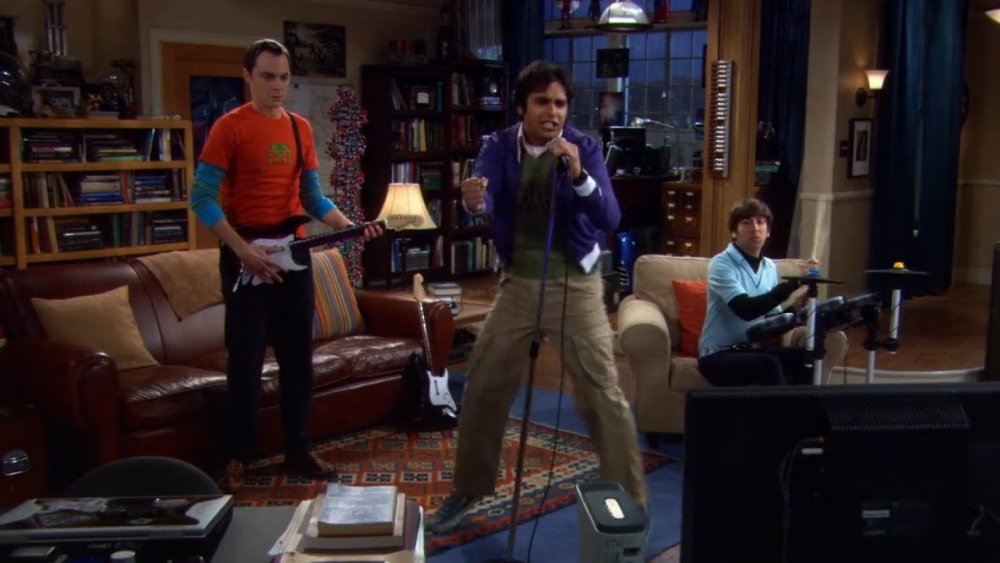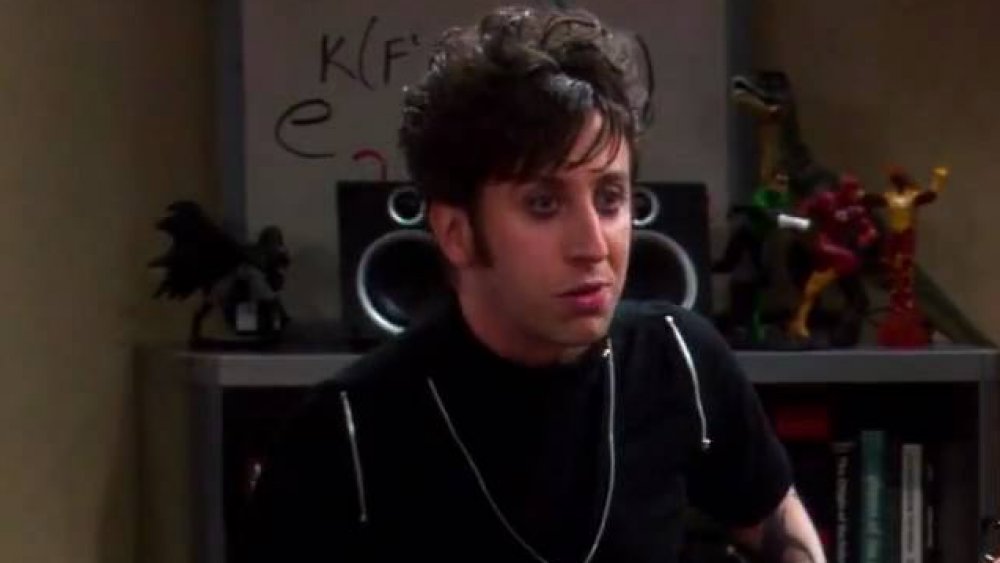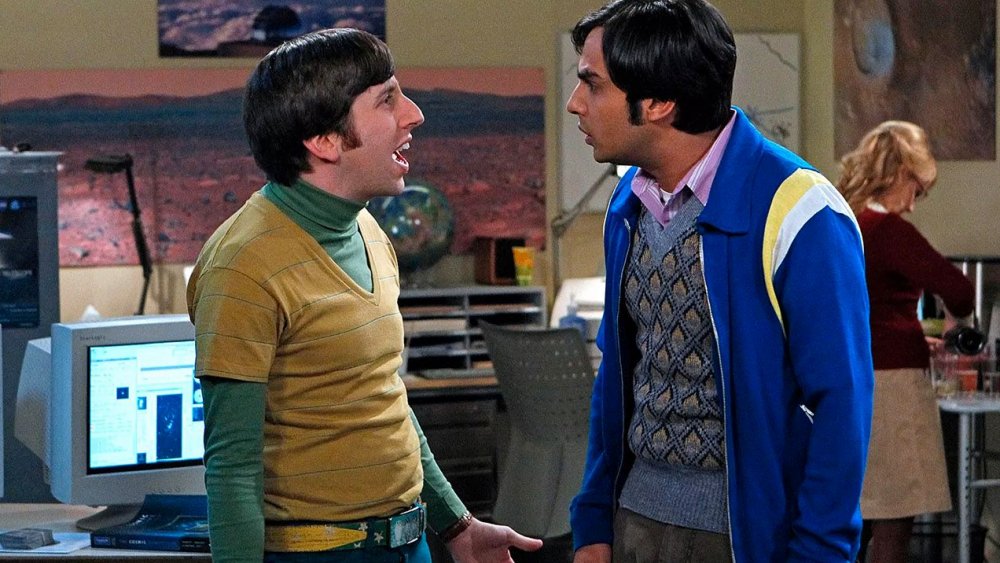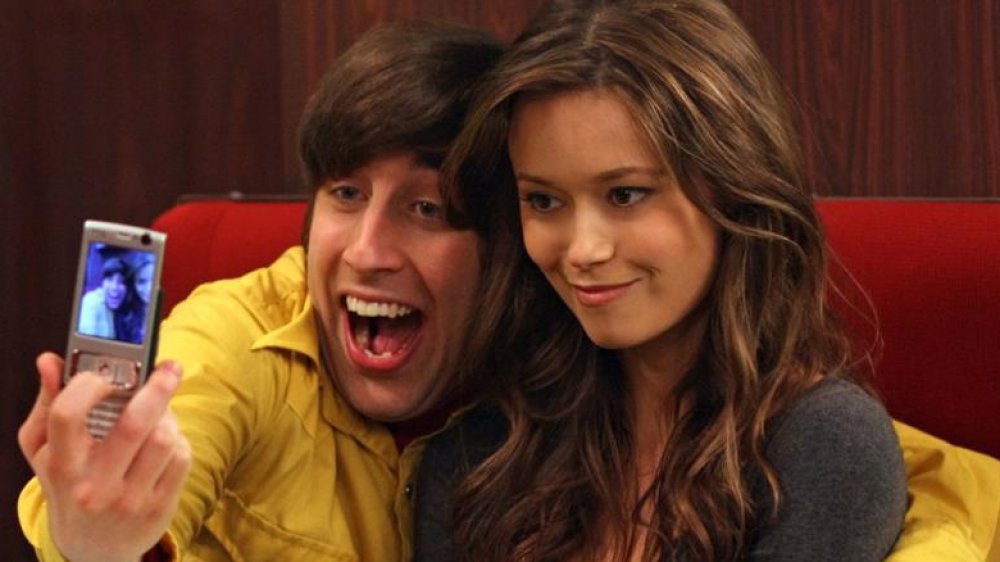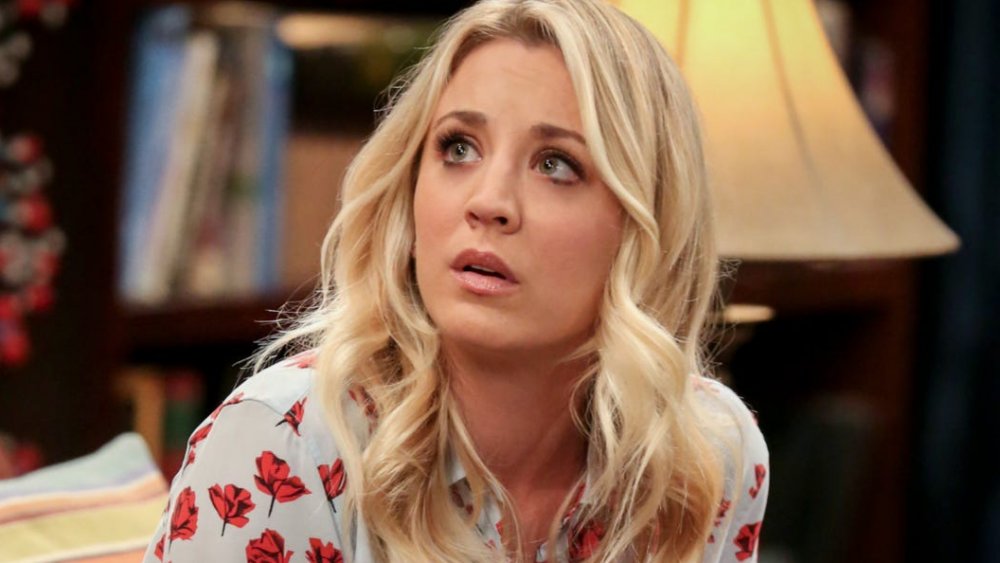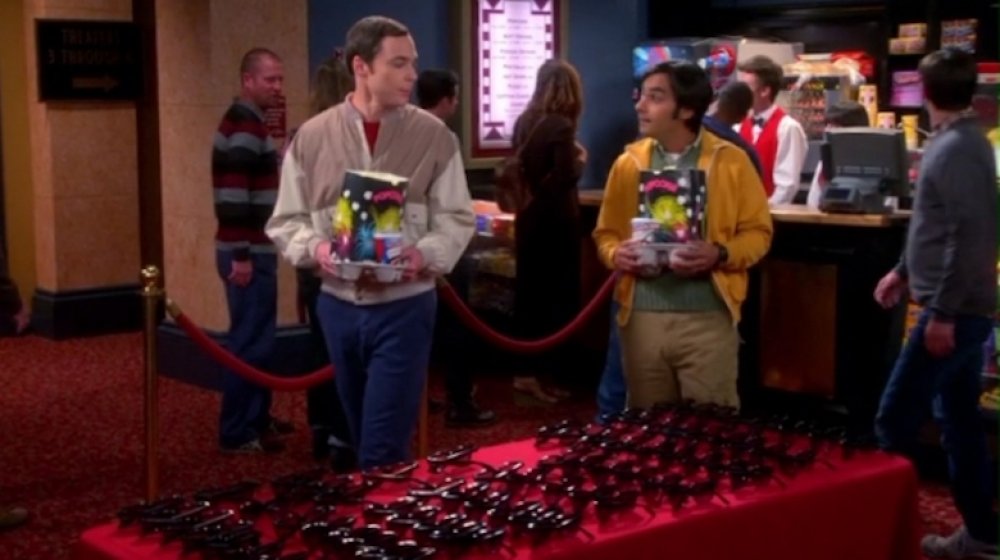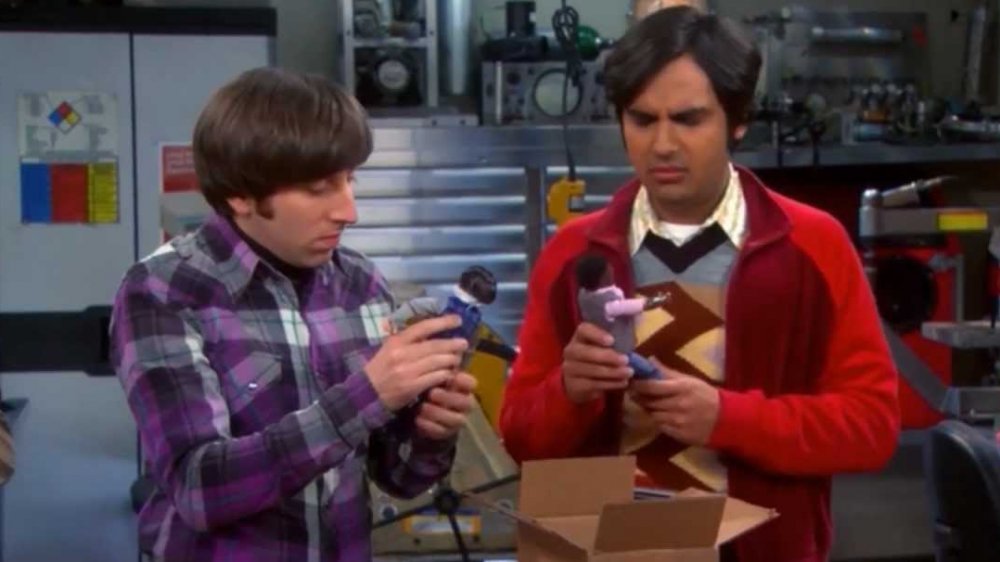Moments From The Big Bang Theory That Didn't Age Well
The Big Bang Theory is one of the longest-running television sitcoms of all time. From 2007 to 2019, huge numbers of viewers showed up for each and every one of its 279 episodes, eager to see what kind of professional and social hijinks awaited genius but awkward scientists Sheldon, Leonard, Howard, Raj, Amy, and Bernadette (and their more outgoing compatriot, Penny). Big Bang now enjoys a robust life in the secondary market — reruns air on hundreds of local stations and on cable TV, and they're available to stream, too. The Big Bang Theory has become a kind of sonic wallpaper for millions, a charming, pleasant, unchallenging comedy ideal for repeated viewings or household background noise.
In fact, it's such an enduring part of the cultural landscape that it's easy to not pay close attention to it, but if you really focus, that's when the cracks start to show. The Big Bang Theory is loaded with jokes, references, plot lines, and character traits that expose the show for what it is — an increasingly quaint and slightly outdated relic of the past. From creepy behavior to offensive jokes, here are some parts of The Big Bang Theory that just didn't age well.
Sheldon should've been fired for his behavior
The "Me Too" and "Time's Up" movements began in the entertainment industry, rooting out aggressive and inappropriate sexual and sexist behavior among powerful producers, studio heads, and actors. As more accusers of big names like Harvey Weinstein and Louis C.K. came forward, it trickled down into many other American workplaces, turning into a cultural referendum on what is and isn't appropriate in labor, particularly male behavior toward women.
That led to a reconsideration of popular culture through this new social lens, and as a result, some parts of The Big Bang Theory haven't aged well, particularly Sheldon Cooper's tendency to bluntly say whatever is on his mind without regard for social graces or the feelings of others. What would be horrendous real-life incidents were played for laughs on The Big Bang Theory, which in retrospect is out of date and alarming.
For example, in the 2013 episode "The Egg Salad Equivalency," Sheldon tells his assistant, Alex, that, "A woman is like an egg salad sandwich on a warm Texas day — full of eggs and only appealing for a short time." But it gets worse ... and racial. When Sheldon is forced to discuss this incident with African-American HR rep Janine, he doubles down, citing how women are "slaves" to their desires, even Janine. Yep, Sheldon called a Black woman a slave.
It's no longer weird to be a nerd
When The Big Bang Theory premiered in 2007, its entire conceit was a fairly original one — a mainstream, primetime network sitcom about nerds. Sheldon, Leonard, and the rest of the gang (except for Penny) worked as professional, top-level scientists, and when they weren't researching lasers or theoretical physics down at the university, they'd gather to do things like watch sci-fi and fantasy TV shows or go to the comic book store. In other words, they engaged in the activities largely associated with nerds, geeks, dweebs, and dorks, with the implication that this prevented them from fitting in to society at large or landing dates.
But some funny things happened, both within the universe of the show and because of the show. Despite being nerds, all the male Big Bang Theory characters enjoyed active love lives, with all but Raj married by the series' end. And in the real world, The Big Bang Theory's relentless popularity normalized nerd culture. It's no longer strange and obscure to like geeky things. In fact, the two most-watched TV events of May 2019 were the finales of The Big Bang Theory and the fantastical Game of Thrones, while the comic-based Avengers: Endgame filled movie theaters and became the highest-grossing movie of all time.
There's a lot of gender stereotyping in The Big Bang Theory
Throughout its run, The Big Bang Theory held to a steadfast and inaccurate supposition that liking sci-fi and fantasy franchises like Star Trek and Game of Thrones would make you a social outcast. But that wasn't the only thing that Big Bang Theory got wrong about esoteric entertainments. The show also supported the notion that only men like "nerdy" things.
Throughout the series, it felt like Penny's only purpose was to be a foil, a representative of the world at large to play off the geeky Sheldon and Leonard. The pair would get really into a comic book or a board game, and Penny would discover them and make a joke about it, mocking them for liking such a pursuit or implying that such activities were the provenance of outcasts because she'd never heard of it or didn't understand it. Needless to say, it's outdated at best and sexist at worst to suggest that women don't like comic books, sci-fi, or role-playing games. Equally annoying, when Stuart hires a comics-loving woman named Denise to work at his comics store, she's treated like a unicorn, as if it's super rare that women like superhero stuff. Women attend Marvel movies by the millions, for example. Big Bang's presentation of women not liking geeky things is just plain archaic.
The 'will they or won't they' dynamic is a stale sitcom cliche
The Big Bang Theory, for better or worse, is heavy with cliches. The use of sitcom tropes at the cost of originality is why some people hate the series, but that familiarity was a source of comfort to some of the show's millions of regular viewers. In a TV landscape where it was surrounded by progressive, single-camera comedies like Veep and 30 Rock, The Big Bang Theory soldiered on with its predictable plot lines and laugh track. But one of its major through-lines felt particularly tired and old when placed up against the competition.
For many years, Leonard and Penny enjoyed a "will they or won't they" dynamic. Sometimes they were a couple, then writers would find a way to split them up, only for them to get back together. This kind of uncertainty — as evidenced by Sam and Diane on Cheers or Ross and Rachel on Friends — can both engage and frustrate an audience who just wants the show's main couple to get together and stay together. But fellow 2000s comedy Parks and Recreation didn't mess around with that, heralding a new age of sitcoms. Characters Andy and April got together quickly and stayed married, and Leslie and Ben did the same. That made Leonard and Penny's constant romantic drama feel out of time and unnecessary.
Howard's mother is a one-note joke, and it's not funny
Some standard sitcom elements utilized by The Big Bang Theory don't feel comforting as much as they do like thievery from earlier, and arguably better, sitcoms. For example, it just seems cheesy and egregious now how The Big Bang Theory ripped off the idea of an unseen character.
Howard's mother, Mrs. Wolowitz, is often heard — screaming from another room — but never shown, much like Norm Peterson's wife, Vera, from Cheers or Maris Crane on Frasier. The latter never showed up in the flesh because Niles' described her as being so grotesquely thin and frail — or overweight — that no living human actor could live up to that. Similarly, Mrs. Wolowitz was extremely and impossibly overweight, and so it made more sense to just have her offscreen and for viewers to imagine just how large she was.
So then, not only is this a blatant retread of what Frasier did, it's also a very mean and very thin running joke about a character who's overweight. In these slightly more socially conscious times of "wokeness" and anti-bullying advocacy, it's uncomfortable (to say the least) that The Big Bang Theory made countless riffs on "Howard's mother is fat" for a decade.
The pop culture references got stale quickly
Creating contemporary television is a tricky proposition for TV writers. They can load up a show with references to actual pop culture to make a show and its characters seem more grounded in reality, but then they run the risk of the show feeling hopelessly dated when it airs in reruns just a few years later. That was an especially big problem in The Big Bang Theory.
See, the male characters of The Big Bang Theory are massive fans of sci-fi, fantasy, superheroes, and video games, and part of being a culture hound is mass consumption of the latest offerings in those various genres and media. Those worlds move pretty fast, and the Big Bang boys dutifully engage, and when seen later, it's easy for viewers to tell exactly when a particular episode was shot because of their various and specific cultural obsessions.
Take the early 2009 episode in which the characters play a round of Rock Band, the musical video game extremely popular for a hot minute in the late 2000s. Or then there's the 2010 episode when Raj eagerly asks his friends' opinions on "the new episode of Caprica," a Battlestar Galactica spinoff that lasted for one short, little-watched season. In a 2013 installment, Sheldon laments the swift cancellation of SyFy's Alphas. Perhaps the references most lost to time occur in the Big Bang pilot episode, when Sheldon voices his appreciation for forgotten pastimes like MySpace and checking out DVD commentary tracks.
There's a 'goth' episode of The Big Bang Theory
The Big Bang Theory is often dated by its ultra-specific pop culture references, but you know what else hasn't aged well? The show's exploration of broad social trends. A case in point is the 2009 episode "The Gothowitz Deviation," which finds Raj and Howard single and not loving it, so they're thinking outside the box in order to attract women. They decide to look for potential romantic partners at a nightclub that caters to "goths." That's a legitimate subculture, but perhaps to appeal to as broad an audience as possible, the show doesn't really seem to know what being goth actually means.
With his choppy hair and heavy black eyeliner, Howard looks less goth and more like a reject from a not-all-that-popular-by-2009 pop-punk band like Fall Out Boy. He (and Raj) additionally sport fake sleeve tattoos, which seems more metal than goth. That's to say nothing of Howard's tall black boots, a choice straight out of the KISS wardrobe closet. The whole endeavor was a shot at contemporary culture that missed, making it all painfully weird more than a decade after the fact.
There are a lot of jokes about LGBT people
With breakthroughs in the last few years in regards to the acceptance and celebration of the LGBT+ community, it's shocking to look at old sitcoms where people who aren't heterosexual or who don't adhere to traditional gender identities often wind up as the butt of a joke. And the joke was little more than "that person isn't heterosexual" or "that person doesn't adhere to a traditional gender identity." And unfortunately, those kinds of gags were socially acceptable during The Big Bang Theory's run.
In the pilot episode, Leonard sees his new neighbor, the conventionally attractive Penny, for the first time and quips that she's a "significant improvement over the old neighbor." Sheldon concurs, pointing out that the previous resident of Penny's apartment was "a 200-pound transvestite with a skin condition." A few minutes later, Leonard makes great pains to ensure that Penny realizes he and Leonard are just friends and not, perish the thought, a couple. But while that episode aired way back in 2007, one of the show's longest-running gags was that Raj and Howard had unresolved romantic feelings for each other, simply because they were such close friends.
Howard's creepy behavior in The Big Bang Theory was supposed to be hilarious
The "ladies' man" has been a standard television character type for decades — the guy who thinks he's hot stuff (whether he actually is or not) and who endlessly hits on women (whether he's successful or not). Some of the fictional wannabe lotharios who've garnered shrieking, hysterical responses from sitcom laugh tracks include Barney Stinson from How I Met Your Mother, Bud Bundy from Married... with Children, and Howard Wolowitz from The Big Bang Theory.
In the years before he falls in love with and marries Bernadette, Howard creepily sexualizes most every woman he meets. In the early seasons of the show it's a running joke — meaning it's supposed to be funny — how Howard makes extraordinarily suggestive come-ons at Penny, and she rejects these forever unwanted advances. Later in the show, Sheldon not so hilariously tells Penny, a budding actress, that Howard looked up her unclothed scenes on the internet. Some of Howard's behaviors are so problematic that they're illegal, particularly the time when he and Raj locate a house where America's Next Model contestants are staying, and they use a drone to spy on them sunbathing topless.
'Rent' was already uncool by the time Penny starred in a production
Before Hamilton came along, the last Broadway musical to capture the national attention was Rent, a vital, heartbreaking work about artists living, loving, and creating in Manhattan's East Village in defiance of the encroaching HIV/AIDS crisis. It hit the Great White Way in 1996, won four Tony Awards and a Pulitzer Prize, was adapted into a movie, and ran for 12 years, with the curtain coming down in 2008.
That same year, The Big Bang Theory aired "The Loobenfeld Decay," an episode which finds Penny cast in the major role of Mimi in a Los Angeles-area stage production of Rent. By this time, though, Rent was on its last legs — although it was embedded enough into the general culture that a mainstream sitcom like The Big Bang Theory could reference it, it was also a time capsule, a show very much of the '90s about life in the '80s. Penny working hard in a production of Rent is hopelessly dated on so many levels.
Poorly aging references, in 3D!
In the early 2010s, it sure seemed like 3D movies were the next big breakthrough in entertainment. However, the craze turned out to be just that — a fad, brought on by the mega-popularity of Avatar, and akin to one of the 20th century's other periodic 3D resurgences. Making movies come alive is the basis for the plot of the 2011 episode "The Speckerman Recurrence." Leonard's old school bully (Lance Barber) approaches him about developing a technology to make 2D movies instantly 3D, and rather than put him off because 3D is a passing fancy, he declines to help out because the science is impossible.
A similarly dated moment on the same subject occurs in the episode "The Gorilla Dissolution." Raj and Sheldon attend a 3D movie, and while the former grabs a pair of theater-provided glasses, Sheldon brings his own, so as to avoid catching a virus — a real concern back in the day.
Cutting edge technology is no longer that
No matter how miraculous, profound, or transformative a technology might be, human beings seem to ultimately get used to a it, incorporate it into their lives, and grow nonplussed as they await the next big breakthrough in gadgetry. Many of the main characters on The Big Bang Theory are cutting-edge scientists who also vigorously consume consumer-level technology, so many episodes focus on the guys geeking out over some new thing, either at work or at home. Sometimes that object is evergreen, like a powerful laser or a video game console; other times, the characters' level of excitement is a clue to viewers to exactly when in the past the episode was shot.
In 2013's "The Cooper/Kripke Inversion," Howard splurges on an expensive, state-of-the-art 3D printer. Just a few years later, 3D printers are a regular part of life, occupying countless classrooms and hospitals, used to help kids learn design and give medical professionals valuable tools. (Howard, with Raj, uses one to make a plastic whistle and action figures.) There's also the 2012 episode "The Beta Test Initiation," in which Raj buys a brand-new iPhone 4S, the first in Apple's product line to offer the friendly-voiced digital assistant Siri. This Big Bang was made during that brief period of time when people were obsessed with — and actually used — Siri, before they got tired of it, ignored it, and took it for granted.
